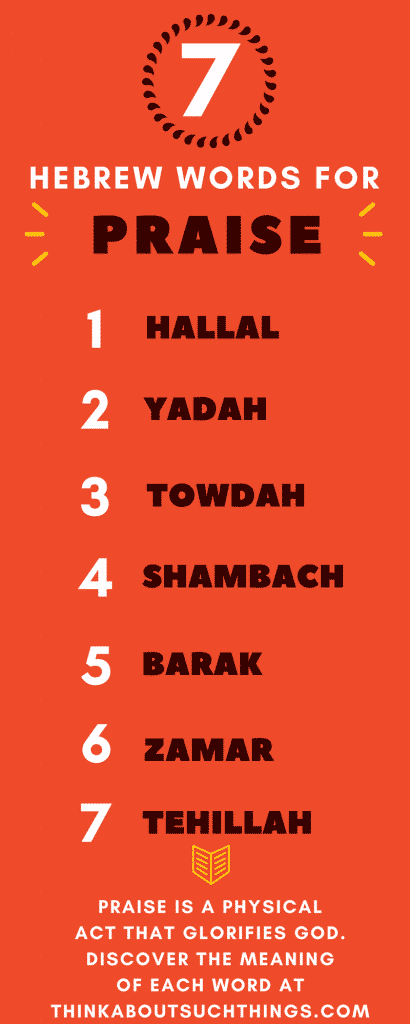In this short study we will look at the difference between praise and worship. We will also look into “what is praise?” and “what is worship.” And the key points to understanding praise and worship. Let’s grab our Bible’s and dive in…
Have you ever wondered what the difference is between praise and worship? Or have you always thought they meant the same thing? Is it just that time during service where the band comes out and we sing to Jesus?
To really understand what praise and worship are we need to crack open our Bibles. We will look at what worship is and what praise is. I will not be able to go super deep into worship. Since you can probably write numerous posts just on that topic alone.

Worship is a be deal in the Bible. It’s also something that is more widely taught about in church. But praise, on the other hand, isn’t. It’s mostly clumped into the same thing as worship.
What is Worship?

The word worship, worshipping and worshipped appears 183 times in KJV.
Worship in the Hebrew is Shachah.
שָׁחָה shâchâh, shaw-khaw’; a primitive root; to depress, i.e. prostrate (especially reflexive, in homage to royalty or God):—bow (self) down, crouch, fall down (flat), humbly beseech, do (make) obeisance, do reverence, make to stoop, worship.
Worship in the Greek is Proskyneō
προσκυνέω proskynéō, pros-koo-neh’-o; from G4314 and a probable derivative of G2965 (meaning to kiss, like a dog licking his master’s hand); to fawn or crouch to, i.e. (literally or figuratively) prostrate oneself in homage (do reverence to, adore):—worship.
Worship in its simplest essence is a heart act towards God. It’s emphasis is humbleness. Both in the Hebrew and Greek language you see this idea of going low in position. Like a dog to it’s master.
Doesn’t sound very beautiful, but it is.
We adore Him….we look up to Him. We realize He is the creator we are His creation. No one is like Him and no will ever be. We worship Him for who He is.
It is fully spiritual in nature. Jesus said “God is Spirit, and those who worship Him must worship in spirit and truth” You can’t fake worship because it comes out of a deep place of understanding who God is and who you are and out of love and devotion to Him.
It’s this idea of knowing He is superior in every way and adoring that. You can know God is superior and not adore Him. That’s the key difference.
I am reminded by the story from Matt Redman. It’s about the song The Heart of Worship. Matt’s pastor decided to get rid of the sound system and the worship band for a season. And just had the congregation gather and worship together with just their voices.
He felt that they had lost their way when it came to worship. So, he stripped everything away to get back to the heart of it all.
It was out of that season the song, The Heart of Worship came forth. And brings such powerful meaning to the lyrics…
When the music fades
All is stripped away
And I simply come
Longing just to bring
Something that’s of worth
That will bless your heart
I’ll bring you more than a song
For a song in itself
Is not what you have required
You search much deeper within
Through the way things appear
You’re looking into my heart
Below is the song if you would like to listen to it….
Can We Worship Other Things Besides God?
Well, technically yes you can. We see this in the Bible as Idolatry. You can read more about in my post about Heart Idols. It talks about how in our modern world we can worship things that we don’t even think we do.
We are called to worship the One True God. We are NOT supposed to worship other things besides Him.
The Bible makes it clear we are NOT to worship…
- Angels or other spirits
- The devil or demons
- A person or people
- False gods
- Money and material items
What is Praise?

Praise is found 248 times in the King James Bible.
Both praise and worship have their similarities and when you praise it is a form of worship (if your heart is in the right place), but what does it mean to praise?
Worship takes place in your innermost being. Praise is a physical act you do before God to express you adoration and worship.
The word “praise” is actually translated into 7 Hebrew words.
These words are all different actions that we can do to glorify God. So, let crack open our Strong’s Concordances (an awesome BIG book with every Hebrew and Greek word from the Bible)
The 7 Hebrew Words For Praise
In our english translations we blanket these beautiful Hebrew words with just one singular one…”Praise”
If you have never studied the 7 Hebrew words for praise this will be eye opening to you. It will paint the psalms and other verses in such a deeper color.
1. The Hebrew Word Hallal
Hallal is a primary Hebrew root word for praise. Strong # H1984
This is where we get our word “hallelujah.”הָלַל hâlal, haw-lal’; a primitive root; to be clear (orig. of sound, but usually of color); to shine; hence, to make a show, to boast; and thus to be (clamorously) foolish; to rave; causatively, to celebrate; also to stultify:—(make) boast (self), celebrate, commend, (deal, make), fool(-ish, -ly), glory, give (light), be (make, feign self) mad (against), give in marriage, (sing, be worthy of) praise, rage, renowned, shine.
I love how one part of the meaning of halal means to “ act madly, act like a madman.” Paints the picture of David beautifully when he danced before the Lord and his people undignified.
Psalm 113:1-3– Praise (hallal) ye the Lord, praise (hallal) o ye servants of the Lord, praise (hallal) the name of the Lord
Other References for Hallal: Judges 16:24; 2 Samuel 14:25; Psalm 113:1-3; 2 Chronicles 7:6; Ezra 3:10-11; Psalms 18:3, 56:4, 63:5, 150:2-4; Nehemiah 5:13 Isaiah 62:9; Jeremiah 20:13; Joel 2:26
2. The Hebrew Word Yadah
We see Yadah in action in most worship services. It simply means “the extended hand, to throw out the hand, therefore to worship with extended hand, to lift the hands.” Strong’s #H3034
יָדָה yâdâh, yaw-daw’; a primitive root; used only as denominative from H3027; literally, to use (i.e. hold out) the hand; physically, to throw (a stone, an arrow) at or away; especially to revere or worship (with extended hands); intensively, to bemoan (by wringing the hands):—cast (out), (make) confess(-ion), praise, shoot, (give) thank(-ful, -s, -sgiving).
Psalm 107:15 – Oh that men would praise (yadah) the Lord for His goodness, and for His wonderful works to the children of men.
Other references for yadah: Psalm 63:1; Genesis 29:35, 49:8; 2 Chronicles 20:21; 2 Chronicles 7:3,6; Psalms 67:3, 108:3; Isaiah 12:1,4; Jeremiah 33:11
3. The Hebrew Word Towdah
Towdah comes from a similar root word as yadah, but is used more specifically.
Towdah literally means, “an extension of the hand in adoration, avowal (an open statement of affirmation; frank acknowledgment or admission.), or acceptance.” Strong’s #H8426
תּוֹדָהtôwdâh, to-daw’; from H3034; properly, an extension of the hand, i.e. (by implication) avowal, or (usually) adoration; specifically, a choir of worshippers:—confession, (sacrifice of) praise, thanks(-giving, offering).
In the Psalms and elsewhere it is used for thanking God for “things not yet received” as well as things already at hand.
You can look at it as the Hebrew word associated with a sacrifice of praise.
I love this quote from, Tom Inglis…
“Enter into His gates with thanksgiving (Towdah), And into His courts with praise. Be thankful to Him, and bless His name (Psalm 100:4). Towdah is a praise-filled confession that God’s word is infallible and working in your circumstances.”
Another verse using the word, “praise” instead of thanksgiving:
Psalm 50:14 -Offer unto God praise (towdah) and pay thy vows unto the Most High.”
Other references for towdah: Psalms 42:4, 56:12; Jeremiah 17:26; Jeremiah 33:11
4. The Hebrew Word Shabach
Shabach is pretty simple one to understand and it makes me happy. It’s the moment when you just have to shout it loud how good God is! – Strong’s #H7623
שָׁבַחshâbach, shaw-bakh’; a primitive root; properly, to address in a loud tone, i.e. (specifically) loud; figuratively, to pacify (as if by words):—commend, glory, keep in, praise, still, triumph.
Psalm 145:4 – One generation shall praise (shabach) Thy works to another and declare Thy mighty acts.
Other references for shabach: Psalm 47:1; Psalms 63:3, 117:1, 145:4; Ecclesiastes 4:2; Isaiah 12:6
5. The Hebrew Word Barak
Barak is usually seen in a time of prayer, but it is a from of praise and adoration to God.
It’s a humble position before God. – Strong’s H1288בָּרַךְ bârak, baw-rak’; a primitive root; to kneel; by implication to bless God (as an act of adoration), and (vice-versa) man (as a benefit); also (by euphemism) to curse (God or the king, as treason):
Psalm 34:1 – I will bless (barak) the Lord at all times; His praise shall continually be in my mouth.
Other references for barak: Psalm 95:6; 1Chronicles 29:20; Judges 5:2; Psalms 72:15, 96:2, 103:1-2
6. The Hebrew Word Zamar
Now with Zamar you will start to see of where our modern day worship services involve musical instruments. Churches from all around the world praise God this way and it’s been going on since the Old testament!
Strong’s #H2167
זָמַר zâmar, zaw-mar’; a primitive root (perhaps identical with H2168 through the idea of striking with the fingers); properly, to touch the strings or parts of a musical instrument, i.e. play upon it; to make music, accompanied by the voice; hence to celebrate in song and music:—give praise, sing forth praises, psalms.
Psalm 21:13 – Be exalted O Lord, in Thine own strength, so will we sing and praise (zamar) Thy power.
Other references for Zamar: 1 Chronicles 16:9; Psalm 57:8-9; Judges 5:3; 2 Samuel 22:50; Psalms 61:8, 147:1
7. The Hebrew Word Tehillah
Tehillah is derived from the word Halal. This and Zamar is where we get singing as a form of praise. But it can also be words spoken. – Strong’s #H8416
תְּהִלָּה tᵉhillâh, teh-hil-law’; from H1984; laudation; specifically (concretely) a hymn:—praise.
Isaiah 61:3 – To grant to those who mourn in Zion, Giving them a garland instead of ashes, The oil of gladness instead of mourning, The mantle of praise (tehillah) instead of the spirit of fainting, So they shall be called oaks of righteousness, The planting of the Lord, that He may be glorified.
Other references for tehillah: Exodus 15:11; Psalm 22:3; Deuteronomy 10:21; Nehemiah 9:5; Psalms 9:14, 22:25; Jeremiah 48:2

So, now you know what the difference is between praise and worship! Next time you are at church try praising God in some of these ways. It will truly bring Him glory.
Drop me a comment below and share your thoughts on this. I would love to hear how the Lord has been speaking to you about praise and worship.
If you liked this post check out more articles on faith. The please check out my Christian Articles.

Melissa is a passionate minister, speaker and an ongoing learner of the Bible. She has been involved in church and vocational ministry for over 18 years. And is the founder of Think About Such Things. She has the heart to equip the saints by helping them get into the Word of God and fall more in love with Jesus. She also enjoys family, cooking, and reading.
She has spoken in churches in California, Oregon, Texas, and Mexico and has been featured in Guidepost Magazine and All Recipes Magazine. Read More…

Judith Mills
Thursday 27th of April 2023
This article was just for me! I am a praise and worship leader! Now I can share these meanings with our congregation!!!
Jami
Thursday 17th of March 2022
Great thoughts Melissa. So many times I drag into church,going thru worship as habit.I am praying for the Lord to shake my praise to spring life into my lip service. He is my strength. Oh Lord recreate my praise mantle. Let me wear it well.
Dana
Thursday 9th of December 2021
Wao i love this it's awsome
Dyan
Thursday 14th of November 2019
LOVED this post - I've been a believer for many years, yet never thought about the differences between worship and praise. I appreciate your work in outlining the Hebrew words for praise, and I've bookmarked the page so that I can study further. Bless you!
Ana
Tuesday 5th of September 2017
This is such a practical and great breakdown of Praise's etymology. Thanks for the great post, friend. I'm keeping this one in the bookmarks :)